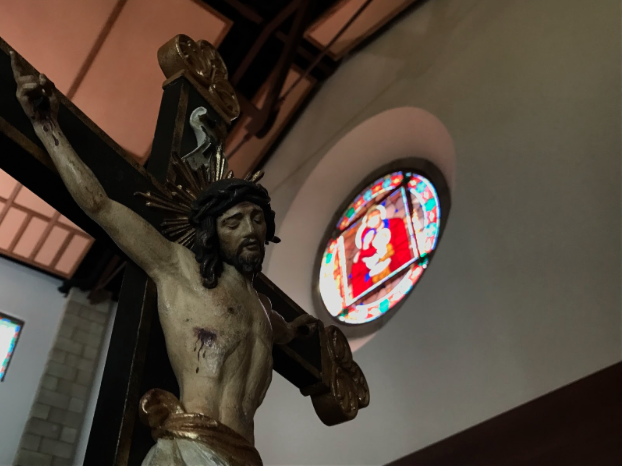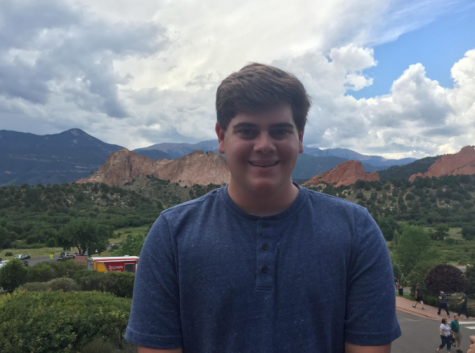Religious persecution persists worldwide
As Christians continue to be persecuted for their faith around the world, Fr. Martin Latiff reminds students to “pray for those who are being persecuted because Christ tells us that we should pray for each other so that the Lord may fill those who are being persecuted with consolation and strength.”
March 16, 2017
Religious persecution may be nonexistent at Cathedral Catholic High School, but ASL teacher Mr. Dano Kaufmann is no stranger to the effects of secular oppression.
“I grew up in Israel and South Africa, and I came to the United States in my teen years,” Mr. Kaufmann said. “I’d wear a yarmulke and I would speak Hebrew. I was persecuted and bullied and harassed for being a Jew. I went to a public school in San Diego where there were neo-Nazis. They walked around drawing swastikas on my lockers.
“They threw eggs at me, pulled my yarmulke off my head, smashed in my mailbox at my house, and followed me home one day.”
Mr. Kaufmann’s story is not an isolated incident.
Christians throughout the world are forced to endure religious persecution every day from low-tolerant, anti-Christian demonstrators, groups, and authorities. In fact, oppressors killed more than 90,000 Christians in 2016, and another 600 million Christians worldwide were prevented from practicing their faith, according to a recent study conducted by the Italian-based Center for Studies on New Religions.
Unlike many of these victims, Mr. Kaufmann’s family members escaped religious persecution in Nazi Germany by moving to South Africa, Israel, Sweden, and England. However, Mr. Kaufmann still feels persecuted when he speaks Hebrew during his travels and people point him out as a terrorist.
In order to fully understand how people suffer from religious persecution around the world, it is necessary to dissect the meaning of persecution.
“Persecution is another word for harassment, another way of saying bullying,” Mr. Kaufmann said. “It is another way of discriminating against someone for something that they sometimes have no control over. It’s a fancy word for all of that.”
As an African-American man of Jewish faith, Mr. Kaufmann knows what it is like to be stereotyped under many different labels. His mother has been persecuted her whole life for being African, he said.
Victimizing and terrorizing someone for their differences is precisely what it means to be a bully.
“Who has the right to persecute someone else for something they have no control over?” Mr. Kaufmann said. “Or even if it’s something they have control over, it’s their belief. If I believe Jesus Christ is my savior, who are you to tell me that I’m wrong?
“So what if I’m from a different country? We all have the inalienable rights living as citizens in this country. What’s different between you as a citizen and me as a citizen?”
Mr. Kaufmann believes persecution has made him more aware of other people’s freedoms. The presence of religious persecution is absent at CCHS primarily because the students, faculty, and administration are placed under an agenda that involves a Catholic education.
But it is easy to recognize the presence of persecution in other places.
While working at a public school before teaching at CCHS, Mr. Kaufmann experienced students fist-fighting and arguing with each other over their differences. Persecution affects many people in the United States and around the world, and this was demonstrated during the international 2017 Women’s March in which five million people marched for human rights.
So how can people prevent and reduce the effects of persecution?
Mr. Kaufmann finds a solution in a Bob Marley song titled “War” that he practices with his ASL 4 class: “Until the color of a man’s skin is of no more significance than the color of his eyes, me say war.”
“We have too much focus on color of your skin or the color of your eyes or the way you walk or the way you talk or the way you do something or what you believe in,” Mr. Kaufmann said. “Forget all of that. Don’t bully. Do unto others as you would do unto yourself. Live aloha.
“If you have nothing nice to say, you’re not thinking hard enough.”
Religious persecution still ranks as a rapidly increasing issue on a global scale. Just this past week, a new wave of bomb threats targeted Jewish centers in seven states, and this prompted all 100 United States senators to ask the federal government for increased security.
Within the past few years, religious persecution against Christians has become more widespread.
According to Open Doors USA, 75 percent of the world’s population lives in areas with severe religious restrictions, and Christianity Today reports that approximately 215 million Christians experienced high, very high, or extreme persecution last year.
Although Christianity has been banned or is not condoned in several nations, including North Korea and China, most of the blame for these statistics can be placed on extremist groups such as ISIS, which are responsible for a third of the Christian deaths last year, according to the Center for Studies on New Religions.
“I know of people who have faced persecution particularly in the Middle East and in Iraq and Syria,” CCHS on-campus priest Fr. Martin Latiff said. “Christ and the Gospel tells us that if we are going to be His disciples, we have to be ready for this aspect of being his disciples which is the reality of persecution.
“Our Lord was persecuted, so it should not surprise us that if we follow Christ, there’s going to be groups that may not like what we speak or transmit about our master.”
Fr. Martin attributes the rise of Christian persecution to the spread of secularism. People who live secular ways of life may not care or have compassion for Christians who are being persecuted. A secular mentality has become more widespread as nations become indifferent to the Christian faith.
But Fr. Martin believes that if people are led to an encounter with Christ, they will become more aware and sympathetic of the Christian persecution crisis currently underway in the Middle East and around the world.
“The solution is in Christ,” Fr. Martin said. “The more people who are led to an encounter with our Lord, the more they will come to know him, and when they come to know him, they will come to know his message, the message of charity, love, compassion, forgiveness, selflessness, and service.”
Fr. Martin would like more students to be made aware of Christian persecution.
“We have to be attentive of what the other countries and nations around the world are going through,” Fr. Martin said. “We are called to love our neighbors. How can we love our neighbors if we don’t know what our neighbors’ needs are?”
CCHS student and Kairos 3 retreat leader Soraya Moss ’17 sympathizes with Christians who are being persecuted worldwide, calling on her fellow students to remember and to pray for these people.
“No one should have to endure pain, suffering, or even fear because of their race or religious beliefs,” Moss said. “As disciples of Christ, we are called to walk in His way and love others despite their ethnicity, background, or faith.
“My advice to my fellow students would be to embrace who you are and accept others who do the same, because we are all different.”
The current persecution of Christians in the Middle East brings into question the safety of traveling in and around persecution-influenced areas around the globe.
From June 12-22, 18 CCHS students will tour Europe through a program run by the Explorica Tour company. Students will travel to London, Paris, Milan, Rome, Pompeii, Sorrento, and Capri.
“Safety is our number one priority when it comes to traveling with students,” CCHS Latin teacher and European trip moderator Ms. Kelle Webb said. “Our European tour includes comprehensive coverage of $50 million liability policy, which protects our students, chaperones, and school. Our group will also be traveling with a 24/7 safety expert and tour guide, as well as emergency support.”
A lack of knowledge regarding different cultures is a major reason why persecution exists, Ms. Webb said. The Europe trip will allow students to learn more about European cultures, and students will ultimately learn more about diversity.
“Hatred towards Christians, or any religion for that matter, is bred through the lack of understanding others’ cultures and beliefs,” Ms. Webb said. “We are all God’s children and therefore we should always take it upon ourselves to learn, understand, and appreciate one another, and embrace our differences.
“I will always encourage everyone, young and old, to travel and explore other parts of the world and experience just how beautiful diversity can be.”
As per Ms. Webb’s advice, the most effective way people can combat persecution is for everyone to open up to one another so that people will learn more about each other and promote a life of peace.
“We need to smell more flowers,” Mr. Kaufmann said. “We need to be more friendly. We need to have more colorful people around our campus, and I don’t just mean our campus at Cathedral, I mean our campus of life.
“Open up a window. Turn on some music. Color in some pages. Be excited about life and not so scared to live it. Let’s just focus on humanity and be kind to one another.”






















































